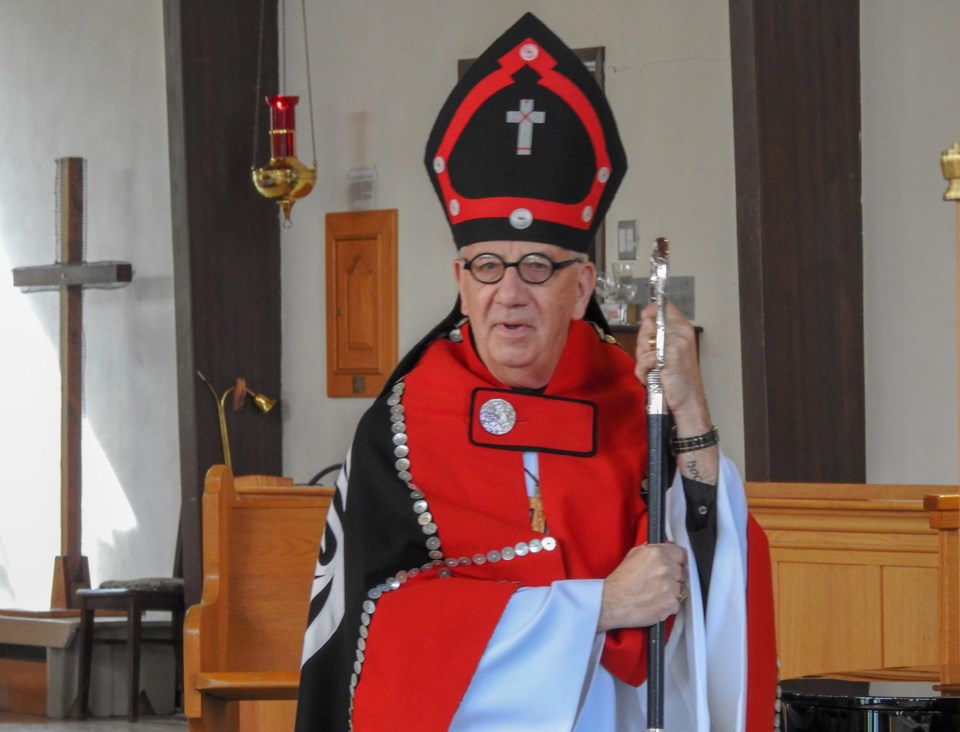Fifteen grandkids, a workshop and the creation of wooden toys are the new avocation of soon-to-be retired Anglican Bishop Logan McMenamie.
“I need to spend some time and be with them [the grandchildren], personally,” McMenamie said. “And I’ve got an idea that I can create a shop and buy some tools and start building some toys for them with woodworking.”
After serving as bishop of the Anglican Diocese of British Columbia for six years, McMenamie announced his retirement on Dec. 5, in a letter to the 45 parishes across Vancouver Island, the Gulf Islands and Kingcome Inlet.
The Canons of the Diocese stipulate retirement is mandatory at age 70, an age McMenamie reaches on May 1.
McMenamie was the 13th bishop of the diocese. He was installed on March 2, 2014, following James Cowan, now retired.
Prior to his establishment as bishop, McMenamie was a cleric on Vancouver Island for 26 years beginning in 1980 as a Sunday school teacher in Port Alberni. He studied divinity at the Vancouver School of Theology, part of the University of British Columbia. He is married to Marcia McMenamie, with whom he has five children.
Born in Greenock, Scotland, McMenamie never lost his personal link with Scotland. Twice, in 2011 and 2013, he made pilgrimages to Iona, Scotland, known as the birthplace of Celtic spirituality.
Before his installation as bishop, he was Dean of Columbia and rector of Christ Church Cathedral in Victoria, 2006 to 2014, a position now held by the Very Rev. M. Ansley Tucker.
With retirement looming, McMenamie said he regrets he will not play a major role in any upcoming transformation of the church.
Many in the Anglican Church in Canada are now reeling from a report detailed in a recent issue of the Anglican Journal warning the church will cease to exist by 2040 if present demographic trends continue.
McMenamie said he doubts the church will disappear and is biased enough to believe Anglicans have a unique and valuable approach to the ongoing story of Jesus Christ that will continue to attract people exploring spirituality.
But recently identified trends mean the church will have to bring stability to parishes and look for ways to develop their congregations.
“We’ll have to start asking how are we relating to the communities in which we find ourselves,” McMenamie said. “What does it mean to be a disciple of Jesus Christ in those communities?
“We need to be on our toes to do this kind of work,” he said.
During his tenure as bishop, McMenamie was notable in his formal and ongoing efforts at seeking reconciliation with First Nations and asking forgiveness of the residential school survivors.
In 2015, he offered a formal apology to survivors at the site of the former St. Michael’s Indian Residential School on Cormorant Island, home to the Namgis First Nation and the village of Alert Bay.
The following year, he walked the 480 kilometres from Alert Bay to Victoria on a kind of pilgrimage of reconciliation, asking for permission from First Nations leaders to continue living and working on their traditional territory. In 2017 he made a similar journey from Port McNeill to Sooke.
On Christmas Eve 2018, Alex Nelson, elder of the Musgamagw Dzawada’enuxw in Kingcome Inlet, conducted a giving ceremony at Christ Church Cathedral.
Standing on cedar boughs McMenamie was draped with a traditional First Nations button blanket and a mitre made in a similar style. He adopted them as his clerical robes.
He has always maintained that reconciliation is not something that can be performed, completed and forgotten. It’s part of a spiritual, emotional and personal journey all Canadians can undertake.
“I’m still not convinced we as a nation have dealt with it as much as we need to deal with it,” McMenamie said.
“I don’t know what it will look like, but there is still a bit of work to be done,” he said.



